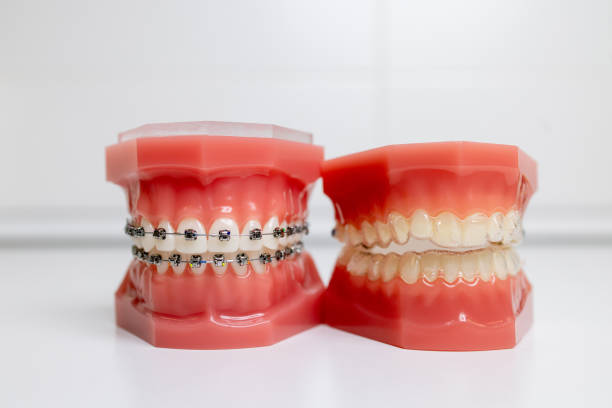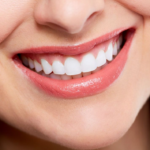Teeth aligners, also known as clear aligners or invisible braces, are a popular alternative to traditional metal braces for straightening teeth. They are made of a clear, plastic material custom-fitted to the patient’s teeth and worn for a certain period, typically several months.
Choosing the right teeth aligner is important for achieving the desired results and avoiding potential risks and side effects. Unfortunately, some teeth aligners on the market are ineffective and can even be harmful. In this blog, we will discuss the four worst teeth aligners that you should avoid.
The four worst teeth aligners to avoid are generic, one-size-fits-all, DIY, unqualified providers, and aligners from disreputable online companies.
Teeth Aligner #1: Generic, One-Size-Fits-All Aligners
Generic, one-size-fits-all aligners are not custom-fitted to the patient’s teeth and are often sold as a “quick fix” solution for straightening teeth. These aligners may not provide the desired results and can even cause damage to the teeth and gums.
Risks and potential side effects of generic, one-size-fits-all aligners include discomfort or pain, poor fit, and ineffective treatment. They can cause tooth decay, gum recession, and other health issues.
Custom-fitted aligners, however, are tailored to the patient’s needs and provide a more effective treatment. They are created using impressions, x-rays, and photographs of the patient’s teeth to ensure a proper fit and treatment plan.
Teeth Aligner #2: DIY Aligners
DIY aligners are kits that can be purchased online and made at home. These aligners are not created by a qualified professional and may not provide the desired results.
Risks and potential side effects of DIY aligners include poor fit, ineffective treatment, and damage to the teeth and gums. They can also lead to oral health issues such as tooth decay and gum disease.
Professional teeth aligner treatment is provided by a qualified professional, such as an orthodontist or dentist, and includes a consultation, treatment plan, and custom-fitted aligners. This ensures a proper fit and effective treatment.
Teeth Aligner #3: Aligners from Unqualified Providers
Aligners from unqualified providers may not be created using proper techniques or materials and may not provide the desired results. These providers may need the necessary training or experience to create custom-fitted aligners.
Risks and potential side effects of aligners from unqualified providers include poor fit, ineffective treatment, and damage to the teeth and gums. They can also lead to oral health issues such as tooth decay and gum disease.
It is important to find a qualified professional, such as an orthodontist or dentist, who has experience creating custom-fitted aligners and a good track record of success with patients.
Teeth Aligner #4: Aligners from Disreputable Online Companies
Aligners from disreputable online companies may be counterfeit or made with low-quality materials. These aligners may not provide the desired results and can even be harmful.
Risks and potential side effects of aligners from disreputable online companies include poor fit, ineffective treatment, and damage to the teeth and gums. They can also lead to oral health issues such as tooth decay and gum disease. Additionally, these aligners may not be FDA-approved or meet safety standards.
Researching the company and reading reviews before purchasing aligners online is important. It’s also essential to look for certifications and FDA approval. It’s always safer to purchase aligners from reputable companies with a track record of providing high-quality and safe products.
Choosing the Right Teeth Aligner Provider
When looking for a teeth aligner provider, it’s important to research and finds a qualified professional. One option is to look for dental labs nyc that specialize in teeth aligners. These labs often have the expertise and technology needed to create custom-fitted aligners tailored to patients’ needs.
Another option is to search for a denture lab near me that also offers teeth aligners. These labs may also have the expertise and technology needed to create custom-fitted aligners, which may be more convenient for nearby patients.
Finding a qualified professional with experience in creating teeth aligners and a good track record of success with patients is important. You can ask for referrals from your dentist or orthodontist or read online reviews to learn more about different providers.
Conclusion
Choosing the right teeth aligner is crucial for achieving the desired results and avoiding potential risks and side effects. Unfortunately, some teeth aligners on the market are ineffective and can even be harmful. The four worst teeth aligners to avoid are generic, one-size-fits-all, DIY, unqualified providers, and aligners from disreputable online companies.
Finding a qualified professional and researching different providers when considering teeth aligners is important. Additionally, it’s important to consider certifications, FDA approval, and reviews when choosing a provider and to avoid generic, one-size-fits-all aligners, DIY aligners, unqualified providers, and aligners from disreputable online companies.
By avoiding the worst teeth aligners and choosing a qualified professional, you can ensure that you receive a safe and effective treatment that will give you the straight teeth you desire. It’s always better to be safe than sorry, so it’s important to research and choose the right provider to ensure the best possible results. Dental labs in NYC and a denture lab near me are some options you can consider when looking for a teeth aligner provider.
Frequently Asked Questions
-
What are generic, one-size-fits-all aligners?
Generic, one-size-fits-all aligners are not custom-fitted to the patient’s teeth and are often sold as a “quick fix” solution for straightening teeth. They may not provide the desired results and can even cause damage to the teeth and gums.
-
Are DIY aligners safe?
DIY aligners are not created by a qualified professional and may not provide the desired results. They also have risks and potential side effects, such as poor fit, ineffective treatment, and damage to the teeth and gums.
-
How do I know if a provider is qualified?
A qualified professional is typically an orthodontist or dentist with experience creating teeth aligners and a good track record of success with patients. You can ask for referrals from your dentist or orthodontist or read online reviews to learn more about different providers.
-
How can I avoid disreputable online companies?
Research the company, read reviews, and look for certifications and FDA approval before purchasing aligners online. It’s always safer to purchase aligners from reputable companies with a track record of providing high-quality and safe products.
-
What should I consider when choosing a teeth aligner provider?
When choosing a teeth aligner provider, it’s important to consider the provider’s qualifications, experience, and track record of success. Additionally, it’s important to research the company and read reviews before purchasing aligners online.













